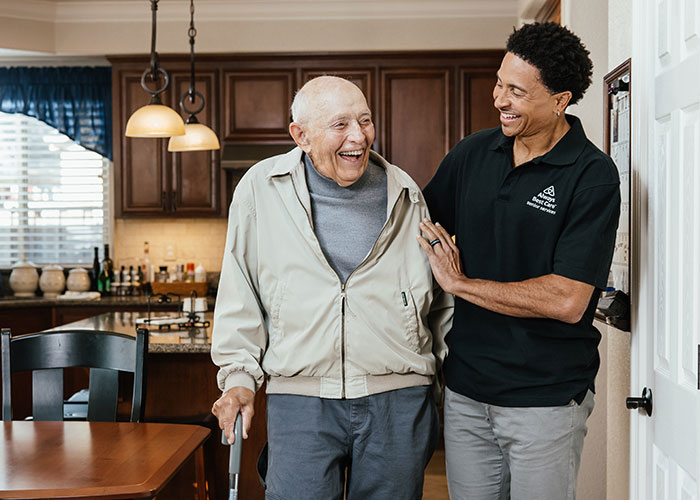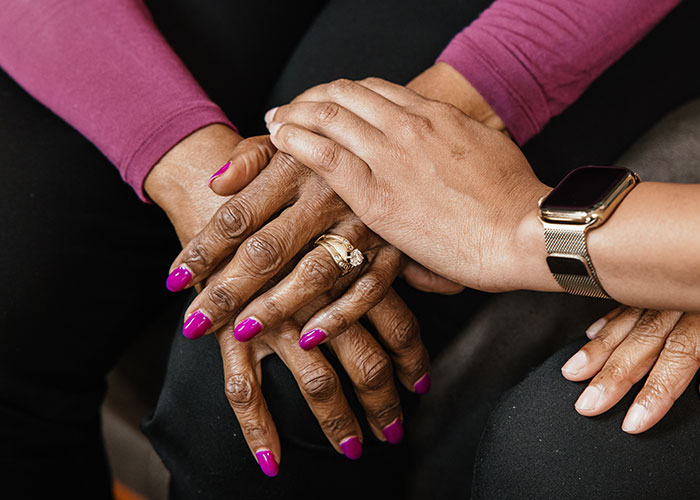Your Guide to the RSV Vaccine: Benefits, Prep Tips & FAQs
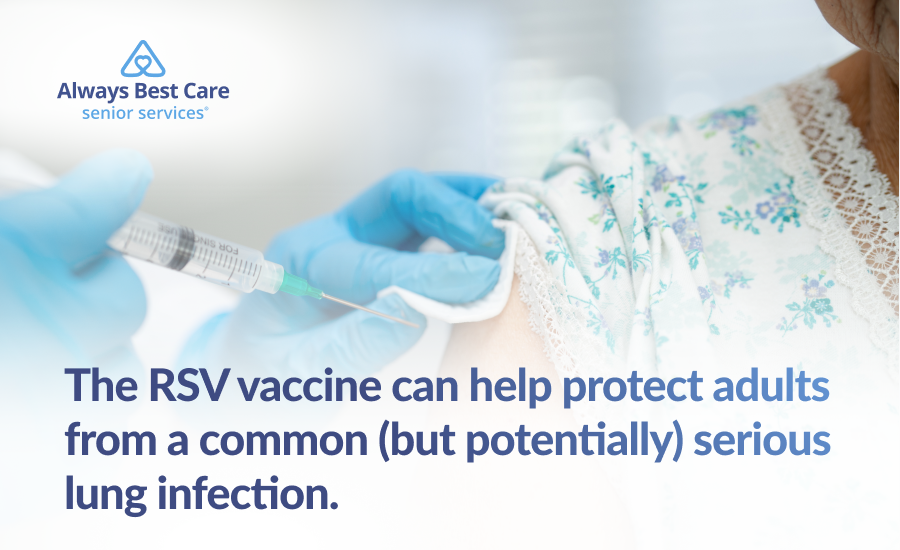
Table of Contents
RSV Vaccine for Adults: Key Takeaways
- RSV might feel like a cold for most people, but in older adults, it can turn serious, sometimes leading to pneumonia or even a hospital stay
- The CDC recommends one dose of the RSV vaccine for adults 60 and up, especially if they’re at higher risk
- One RSV shot offers protection for at least two RSV seasons, and there’s no booster needed (for now)
According to the World Health Organization (WHO), RSV leads to an estimated 3.6 million hospitalizations worldwide each year.
That’s not just a statistic; it could easily be someone you care about.
Older adults face a higher risk of severe RSV symptoms that may lead to hospitalization, particularly if they have underlying health conditions
Whether this is your first time learning about the condition or you’re looking for ways to better protect your loved one, this guide is here to support you with clear, helpful information.
We’ll walk you through:
- Who’s most at risk for severe RSV and why it matters for older adults
- How often your loved one might need the RSV vaccine based on current guidelines
- How to prepare before their vaccination appointment for a stress-free experience
- Answers to common questions about the RSV shot
RSV Vaccine for Adults Explained
Approved by the FDA in 2023, the RSV vaccine for adults helps protect against respiratory syncytial virus (RSV), a common but potentially serious infection that affects the nose, throat, and lungs.
For most healthy adults and older children, RSV usually goes away on its own.
For older adults or those with weakened immune systems, RSV can become more serious and may lead to:
Who’s Most at Risk for Severe RSV?
For many people, RSV feels like a bad cold, but for others, it can lead to serious complications.
If your loved one falls into one of the groups below, getting protected with the RSV vaccine is a no-brainer.
Here’s who’s most at risk:
- Adults age 60 and older: As we grow older the immune system naturally weakens, making it harder to fight off infections like RSV. And if someone already has a condition like asthma, COPD, heart disease, diabetes, or kidney problems, RSV can hit even harder, sometimes leading to more serious complications.
- Those with weakened immune systems: This includes individuals undergoing cancer treatment, taking immunosuppressive medication, or recovering from major illness.
- Seniors living in nursing homes or assisted living facilities: In shared environments, viruses like RSV spread quickly, and often silently, before symptoms show up.
- Older adults who spend time around young children: Babies and toddlers can spread RSV even when they don’t seem sick. That means grandparents who help with childcare or live in multigenerational households might face a higher risk without realizing it.
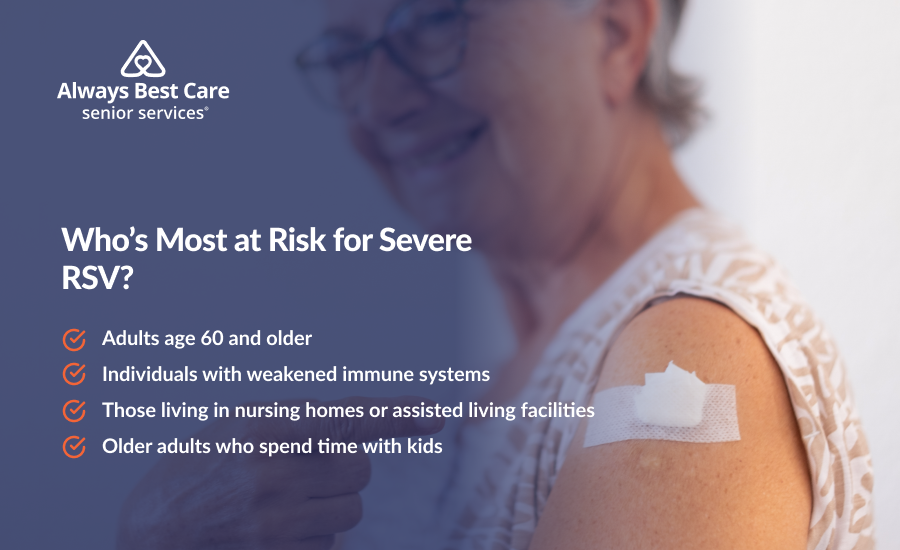
When Should Seniors Consider the RSV Vaccine?
The best time for seniors to get the RSV vaccine is in late summer or early fall, before RSV season starts.
RSV tends to spread more during the fall through early spring, so getting vaccinated ahead of time helps build up protection when it’s needed most.
The CDC recommends the RSV vaccine for adults aged 60 and older, but it’s not a one-size-fits-all decision.
It’s a choice best made in consultation with a doctor, considering their overall health and lifestyle. You should encourage your loved one to consider the RSV vaccine if they:
- Are 60 or older
- Live in a nursing home or long-term care facility
- Spend a lot of time around infants or others at high risk
- Have a compromised immune system
- Have chronic conditions like asthma, COPD, heart disease, or diabetes
Who Should Not Get the RSV Vaccine?
Skip the RSV shot if your loved one has ever had a severe allergic reaction to an RSV vaccine ingredient, since it could cause another serious reaction and endanger their health.
How Often Should You Get RSV Vaccine?
If your loved one is 60 or older, here’s the good news: one shot is enough for now.
- One and done (for most): The RSV vaccine is currently recommended as a single dose for healthy older adults.
- No repeat visits (yet): The CDC does not recommend routine boosters at this time.
How Long Do RSV Vaccines Last?
One dose of the RSV vaccine protects adults aged 50 and older for at least two years.
Since Arexvy and Abrysvo were approved in May 2023, and mResvia in June 2024, research is still ongoing to determine how long protection truly lasts.
What To Know Before Getting the RSV Vaccine
If you’re considering the RSV vaccine for your elderly loved one, you’re already doing something great for their health.
While RSV doesn’t get as much attention as the flu, it can be just as serious. In some cases, it can lead to pneumonia, hospitalization, or other complications.
To ease the anxiety, here’s what you can do to make sure your loved one is fully prepared for their vaccination visit.
1. Talk To Your Elderly Loved One’s General Practitioner
Schedule a quick conversation with your loved one’s GP.
If they have a weakened immune system, take certain medications, or have had allergic reactions to vaccines in the past, the doctor can confirm whether the RSV vaccine is a safe and timely choice.
2. Bring a List of Recent Vaccines
Make sure their GP knows if your loved one recently received:
- A flu shot
- A COVID-19 booster
- The pneumococcal vaccine
- The shingles vaccine
Some vaccines can be given at the same time, while others may need to be spaced at least two weeks apart. Having the dates on hand makes this conversation easier.
3. Prepare for Mild Side Effects
After the RSV shot, your loved one might feel:
- Low-grade fever
- Soreness at the injection site
- Mild fatigue or body aches
These symptoms usually clear up on their own in a day or two.
It’s a good idea to have some water nearby, a cozy spot to rest, and over-the-counter pain relief on hand (like Tylenol) if needed.
4. Time the Appointment Right
RSV usually spreads in fall and winter, so try to schedule the vaccine in late summer or early fall.
For instance, aim for August or September so they’re fully protected before RSV season peaks.
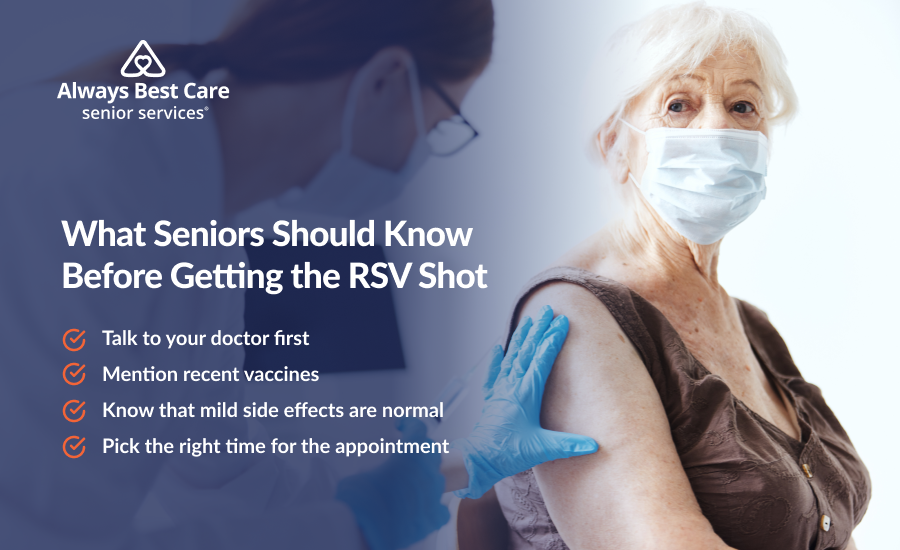
What Are the Common Side Effects of the RSV Vaccine?
Like most vaccines, the RSV shot may cause a few mild side effects, but nothing unusual.
Most side effects are mild and short-lived, often clearing up within a day or two.
Here’s what your loved one might experience after getting the shot:
- Headache
- Mild fever
- Fatigue or low energy
- Muscle or joint aches
- Nausea or an upset stomach
- Diarrhea
The RSV vaccine is safe for most, but check with your loved one’s doctor, especially if they’ve had past vaccine reactions or neurological conditions.
Does Insurance Cover the RSV Vaccine?
Yes, most private health plans cover CDC-recommended vaccines, like flu, COVID-19, pneumococcal, and RSV, at no cost. Just make sure your loved one gets them from an in-network provider.
Since RSV Vaccines for Adults were just added in mid-to-late 2023, it’s a good idea to double-check with your insurance provider before the appointment, just to make sure it’s fully covered.
Experience Personalized Support for RSV Recovery With Always Best Care
At Always Best Care, we don’t administer vaccines, but we know just how challenging RSV can be for older adults, especially during recovery.
If your loved one is dealing with ongoing RSV symptoms like fatigue, breathing issues, or general weakness, our dedicated caregivers are here to provide thoughtful, hands-on support.
We can help with:
- Daily routines like bathing, dressing, and grooming
- Timely reminders for medications or breathing treatments
- Meal preparation that supports immune health and recovery
- Mobility assistance to reduce fall risks
RSV Vaccine for Adults: FAQs
Is the RSV vaccine the same as the pneumococcal vaccine?
No, the RSV vaccine isn’t the same as the pneumococcal vaccine.
The RSV vaccine guards you against respiratory syncytial virus, a common (and sneaky) virus that can cause serious lung infections like bronchiolitis and pneumonia.
The pneumococcal vaccine, on the other hand, targets Streptococcus pneumoniae, a type of bacteria that causes bacterial pneumonia, meningitis, and even bloodstream infections.
Is the RSV vaccine an annual shot like the flu vaccine?
Right now, older adults only need one dose of the RSV vaccine.
That said, researchers are still keeping an eye on how long the protection lasts.
Is it safe to get the RSV vaccine with the flu or COVID-19 shot?
Yes, the RSV shot can be given at the same time as your flu shot or COVID-19 booster, which can make things more convenient, especially during respiratory virus season.
That said, if your loved one prefers to space them out, that’s fine too.
There’s no required waiting period between the vaccines, so you can choose whatever schedule feels best for your senior loved one.


